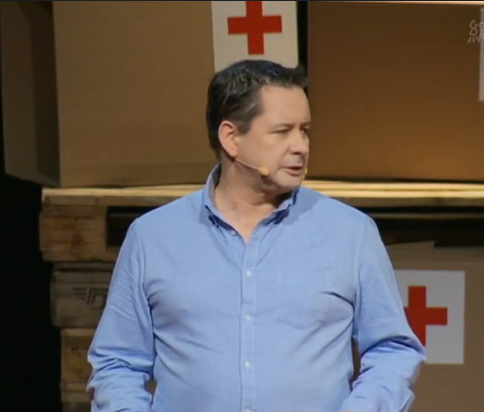The humanitarian model has barely changed since the early 20th century.
人道主義的模型自從20世紀初期就幾乎沒有改變過
Its origins are firmly rooted in the analog age.
它的起源在模擬時代就根深蒂固了
And there is a major shift coming on the horizon.
海平線即將發生重大的改變
The catalyst for this change
這個的催化劑是
was the major earthquake that struck Haiti on the 12th of January in 2010.
發生在2010年1月12日的海地地震加快了海平線的變化
Haiti was a game changer.
海地地震改變了環境的規則
The earthquake destroyed the capital of Port-au-Prince,
這次地震摧毀了海地首都太子港
claiming the lives of some 320,000 people,
導致32萬人喪生
rendering homeless about 1.2 million people.
120萬人無家可歸

Government institutions were completely decapitated, including the presidential palace.
政府機構包括總統府均已倒塌
I remember standing on the roof of the Ministry of Justice in downtown Port-au-Prince.
我記得我站在太子港市中心司法部大樓的屋頂
It was about two meters high,
屋頂大概有2米高
completely squashed by the violence of the earthquake.
已經被地震徹底粉碎
For those of us on the ground in those early days,
對于我們這些地震后早期達到現場的人來說
it was clear for even the most disaster-hardened veterans that Haiti was something different.
很顯然對于那些救災老手來說海地的情況有所不同
Haiti was something we hadn't seen before.
海地的情況是我們未曾見過的
But Haiti provided us with something else unprecedented.
但海地也為我們提供了前所未有的經驗
Haiti allowed us to glimpse into a future of what disaster response might look like
海地讓我們了解到,人們在未來高度相連的世界里
in a hyper-connected world where people have access to mobile smart devices.
如何應對災難,去幫助他們逃離災難
Because out of the urban devastation in Port-au-Prince
由于城市之外的太子港被摧毀
came a torrent of SMS texts -- people crying for help,
大量的手機發出短信--人們呼救,
beseeching us for assistance, sharing data, offering support, looking for their loved ones.
尋求幫助,分享信息,提供支持,尋找他們愛的人
This was a situation that traditional aid agencies had never before encountered.
這種情況是傳統的救援機構未曾遇到的
We were in one of the poorest countries on the planet,
我們身處全世界最貧窮的國家之一
but 80 percent of the people had mobile devices in their hands.
但是80%的人都擁有手機
And we were unprepared for this, and they were shaping the aid effort.
我們沒有預料到,他們塑造了援助工作的模式
Outside Haiti also, things were looking different.
海地之外,情況也不一樣
Tens of thousands of so-called digital volunteers were scouring the Internet,
成千上萬所謂的“數碼志愿者”在網絡上搜尋
converting tweets that had already been converted from texts
將短信信息轉換成推特信息
and putting these into open-source maps,
然后放到開放資源的地圖上
layering them with all sorts of important information -- people like Crisis Mappers and Open Street Map --
把它們和其他各種重要信息結合--這些人就如同危機地圖和公開街道地圖的繪圖者--
and putting these on the Web for everybody
然后把這些信息放在網上供大家
the media, the aid organizations and the communities themselves to participate in and to use.
包括媒體,救援組織和社會群體本身讓大家參與使用
Back in Haiti, people were increasingly turning to the medium of SMS.
在海地,人民越來越傾向使用短信
People that were hungry and hurting were signaling their distress, were signaling their need for help.
那些饑餓和受傷的人們發出遇難的信號,發出求救的信號
On street sides all over Port-au-Prince,
在太子港的街道邊
entrepreneurs sprung up offering mobile phone charging stations.
涌現出很多創業者提供手機充電站
They understood more than we did people's innate need to be connected.
他們比我們更懂得人與生俱來的互相連接的需要











